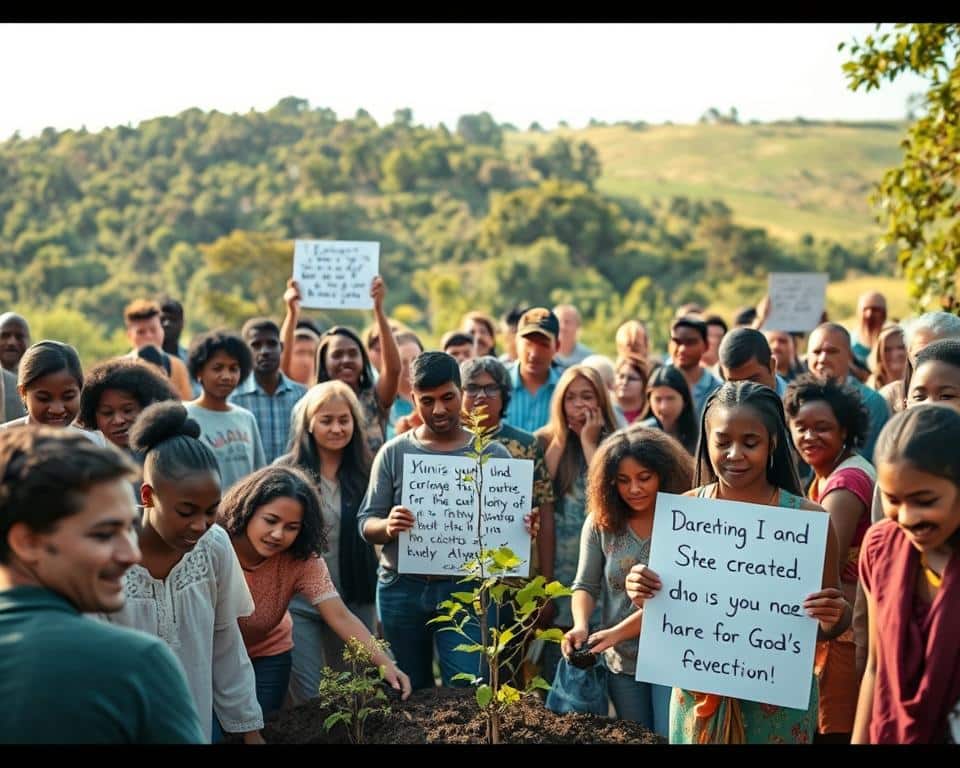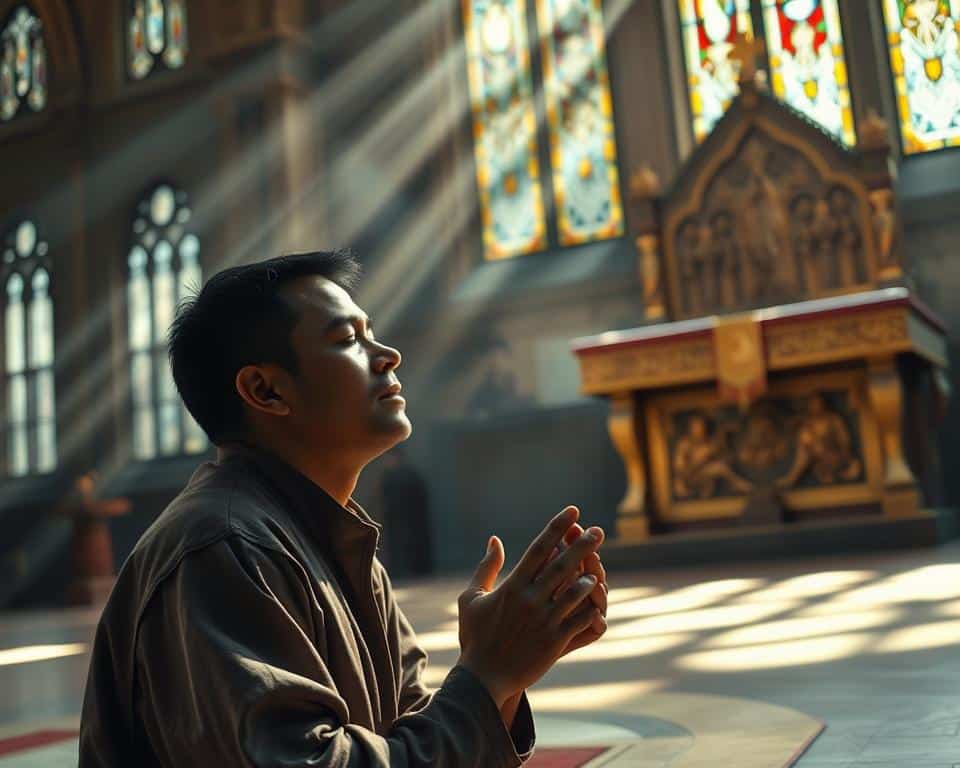“The Earth is the Lord’s, and everything in it.” — Psalm 24:1. This truth reminds us of our role in protecting the world entrusted to us. Scripture calls us to responsibility, starting with Genesis 1:28. Here, God invites humanity to care for His creation.
Today, climate change challenges us to act. Pope Francis’ Laudato Si’ highlights how everything is connected. Faith groups own 8% of habitable land, offering huge conservation potential. This isn’t just about science—it’s about values rooted in God’s word.
At COP28, nine religions united for action. Studies show faith-inspired efforts boost sustainability. For example, a Lent program increased eco-friendly behaviors by 29%. When we live our beliefs, change follows.
Let’s explore how Biblical principles inspire practical care for our planet.
The Biblical Foundation for Environmental Care
The Bible’s first pages establish humanity’s sacred duty toward the natural world. In Genesis 2:15, God places Adam in the garden “to till and keep it”—a call to nurture, not exploit. This “cultivation mandate” mirrors modern stewardship principles, blending sustainable agriculture with divine values.

Genesis and the Call to Stewardship
Often misunderstood, the word “dominion” in Genesis 1:28 comes from the Hebrew “radah,” meaning wise oversight—not domination. Ancient Jewish traditions, like Tu B’Shevat tree-planting festivals, reflect this active care for creation. Today, groups like the Creation Care Initiative apply Genesis 2:15 by teaching soil conservation as worship.
“Look at the birds of the air: they neither sow nor reap… yet your heavenly Father feeds them.” — Matthew 6:26
Jesus’ Teachings on Creation
Jesus’ parables reveal God’s provision for all life. In Luke 12:24, He highlights ravens as models of trust, challenging wasteful resource use. Pope Francis’ Laudato Si’ expands this, urging “ecological conversion” where human and natural wellbeing intertwine.
Across faiths, shared values emerge: Islam’s “Mizan” (balance) and Buddhist “metta” (loving-kindness) echo biblical stewardship. These Scripture-rooted truths inspire practical action—from energy conservation to ethical eating—as acts of worship.
Why Faith and Environmental Stewardship Matter Today
Climate change isn’t just a scientific issue—it’s a moral test of our values. Since 2010, 23.7 million people annually face displacement due to climate-related disasters (IDMC). This crisis demands action rooted in divine responsibility, not just policy.

The Moral Crisis of Climate Change
CO2 levels now hit 424ppm (NOAA), far beyond pre-industrial 280ppm. Isaiah 24:4-6 warns of a mourning earth—a text echoing the 2025 Earth Day theme, “Our Power, Our Planet.” The United Methodist Church’s 2024 fossil fuel divestment pledge shows how values drive change.
Faith Communities as Agents of Change
From Nairobi to New York, believers lead:
- Extinction Rebellion Muslims halted a luxury resort threatening Nairobi Park’s biodiversity.
- Green Faith’s interfaith network launched clean energy projects across 12 nations.
- Baptist churches cut energy costs by 40% with solar panels.
“When we protect creation, we honor the Creator.” — Pope Francis, Laudato Si’
These efforts prove community power. The UK’s 2023 mandate for sustainability education in religious curricula further cements this legacy. Together, we can turn Scripture into solutions.
Practical Steps to Align Faith with Eco-Conscious Living
Living out our faith means taking tangible steps to protect God’s creation. Scripture inspires daily actions—from conserving energy to mindful eating—that reflect our responsibility as stewards. Here’s how to start:
Reducing Energy Use at Home
Small changes yield big impact. LED bulbs use 75% less power than traditional ones. Smart thermostats cut heating costs by 10–12%. Nigeria’s Anglican churches reduced energy use by 40% after solar panel retrofits—a modern example of Psalm 24:1 in action.
Consider switching to 100% renewable energy providers like Green Mountain Energy or Arcadia. A Biblical guide to creation care underscores how conservation honors God’s provision.
Adopting Sustainable Food Practices
Loma Linda University found Adventist plant-based diets reduce carbon emissions by 30%. Try a 7-day meal plan inspired by Genesis 1:29’s “green seed-bearing plants”:
- Meatless Mondays (or Sabbaths) cut food carbon footprints by 22%.
- Local produce supports community farmers—Leviticus 19:9–10’s “gleaning” principle.
- Composting transforms waste into nutrient-rich soil, mirroring Ecclesiastes 3:2’s cycles.
Minimizing Waste Through Recycling
Conduct a home recycling audit using this checklist:
- Label bins for paper, plastic, and metals (Daniel 1:12’s orderly approach).
- Repurpose glass jars for bulk food storage.
- Donate unused items—modern “alms” (Acts 3:2–3).
“Whoever is faithful in small matters will be faithful in large ones.” — Luke 16:10
SYTL research shows 34% of families commit to waste reduction after faith-based workshops. Start small; let every action reflect gratitude for God’s gifts.
How Churches and Mosques Can Lead by Example
Sacred spaces hold unique potential to model sustainable living for their communities. As Proverbs 24:3–4 teaches, “By wisdom a house is built… by knowledge its rooms are filled.” Today, this wisdom translates into retrofitting sanctuaries to reflect our care for God’s world.
Greening Sacred Spaces
From solar panels to rain barrels, houses of worship are reducing their footprint. The United Methodist Church’s $2M creation facility upgrade fund supports projects like Houston’s megachurch, which saved $18,000 yearly with LED lighting.
Seven impactful retrofits include:
- Solar arrays: 38 sites in the Green Pilgrimage Network now run on renewable energy.
- Rainwater harvesting systems, like those at Birmingham’s 2024 geothermal-powered mosque.
- Native plant landscaping, which reduces water use by 50% in arid regions.
The Vatican’s 2025 net-zero plan for 200 historic buildings proves even ancient structures can adapt. Their initiatives cut emissions while preserving heritage—a balance Scripture affirms (1 Chronicles 29:16).
Hosting Environmental Workshops
Knowledge-sharing multiplies impact. The EPA’s 2023 ENERGY STAR program helped 120 congregations audit their energy use. A 4-session workshop model blends biblical ecology with action:
- Genesis 2:15’s stewardship mandate
- Energy conservation as worship (Romans 12:1)
- Waste reduction strategies
- Interfaith green certification steps
“The earth is defiled by its people; they have disobeyed the laws… Therefore a curse consumes the earth.” — Isaiah 24:5–6
These activities transform theory into practice. When a Minnesota church hosted workshops, 72% of attendees installed home solar within a year—proof that education sparks change.
Interfaith Collaboration for Climate Justice
Across traditions, sacred texts unite us in defending our shared home. When Hindu, Christian, and Muslim leaders signed the 2024 Vatican-COP28 declaration on climate migration, they proved that divine justice transcends borders. This growing collaboration reflects Isaiah 56:7’s vision: “My house shall be called a house of prayer for all peoples.”
Shared Values Across Religions
Ancient wisdom guides modern action. Hindu “Ahimsa” (non-harm), Christian “Shalom” (wholeness), and Islamic “Khalifa” (stewardship) all call for protecting life. The Interfaith Rainforest Initiative embodies this, partnering with 37 indigenous groups to safeguard 12 million acres—a living example of Psalm 133:1’s “how good when brothers dwell in unity.”
In Thailand, Buddhist and Christian volunteers restored 8 square miles of mangroves in 2023. Their shared values turned coastal erosion into thriving habitats. As Proverbs 11:14 reminds us, “Where there is no guidance, a people falls, but in an abundance of counselors there is safety.”
Joint Advocacy Campaigns
United voices create tangible change. When 300 faith groups sent Congress a 2024 letter supporting the CLEAN Future Act, they leveraged a Yale-proven 63% policy success rate. Five active interfaith lawsuits now hold polluters accountable, applying Amos 5:24’s call: “Let justice roll down like waters.”
“Creation care is the most universal language of compassion.” — 2025 Global Faith Climate Summit keynote theme
The UN’s Faith for Earth coalition shows how shared initiatives transform society. From solar-powered mosques to Catholic divestment campaigns, these efforts prove that when we honor our Creator together, we heal the world.
Join this movement at the 2025 Global Faith Climate Summit—where Scripture-inspired action meets planetary hope.
Teaching Children to Care for Creation
Raising children with a love for God’s world starts with simple, everyday moments. Deuteronomy 6:7 urges us to teach God’s words “when you sit at home and when you walk along the road.” Today, this includes helping kids see nature as a gift to cherish. Studies show early exposure to creation care shapes lifelong practices.
Faith-Based Environmental Education
Jigsaw RE’s 2024 school garden curriculum proves hands-on learning sticks. Their 10-week “Genesis Gardeners” Sunday school program covers:
- Week 1: God’s design in seed diversity (Genesis 1:11–12)
- Week 4: Water conservation miracles (Exodus 17:1–6)
- Week 7: Composting as resurrection metaphor (John 12:24)
BYU research found outdoor worship increases youth eco-commitment by 27%. Pair Psalms with STEM activities:
“When I consider your heavens… what is mankind that you are mindful of them?” — Psalm 8:3–4 → Astronomy night
Family Activities That Honor Nature
Adventist “Nature Sabbath” guides turn hikes into worship. Try these five Bible-based resources:
- “7 Species” scavenger hunt (Deuteronomy 8:8)
- Muslim Green Ramadan children’s challenge kits
- Lutheran camp’s creation care badge requirements
These stories build understanding of God’s world. As Proverbs 22:6 reminds us, training children in the way they should go includes caring for His creation.
Overcoming Challenges in Faith-Driven Environmentalism
Differing perspectives on creation care can become opportunities for growth. While 68% of evangelicals now support renewable energy (Yale 2024), bridging divides requires biblical wisdom. Here’s how communities are turning challenges into collaborative solutions.
Balancing Tradition and Science
Sr. Dr. Maria Rosaria’s climate modeling ministry shows science and Scripture complement each other. Her team pairs Psalm 104:24’s “wisdom in creation” with data to help churches adapt. Try this 4-step process:
- Study together: The “Science in Scripture” sermon series explores Genesis through ecology.
- Highlight shared values: Laudato Si’ and the Greening the Gospel podcast reframe issues as moral calls.
- Show practical wins: Baptist-Episcopal solar co-ops cut costs by 30%, easing skepticism.
“All truth is God’s truth—whether discovered in a lab or revealed in His Word.” — Dr. Francis Collins
Addressing Political Divides
SYTL research found 23% of conservatives increased climate concern after faith-based dialogues. Respond to common theological arguments with these biblical insights:
- “Dominion means exploitation” → Genesis 2:15’s “keep and tend” Hebrew verbs
- “End times negate care” → Revelation 11:18’s call to “destroy those destroying the earth”
This biblical guide to stewardship offers deeper understanding. When we focus on shared hope rather than divisions, change becomes possible.
Stories of Faith Communities Making a Difference
Concrete results prove that when believers unite for creation care, transformation follows. These stories showcase how Scripture inspires real-world impact—from clean water access to reforestation efforts spanning years.
Christian Creation Care Initiatives
The LDS Church planted 1 million+ trees since 2018, fulfilling Isaiah 41:19’s promise to “put in the wilderness the cedar.” Their global initiatives now cover 37 countries.
In Nigeria, Anglican boreholes brought clean water to 15 villages in 2023. As Isaiah 58:11 says, “The Lord will guide you… and satisfy your needs in scorched places.”
Seven Catholic groups earned 2024 Laudato Si’ awards for measurable wins:
- Franciscans reduced waste by 62% at 14 monasteries
- Jesuit schools installed solar at 92% of U.S. campuses
- Caritas International provided drought-resistant seeds to 800,000 farmers
Muslim-Led Conservation Projects
The Green Mosque Network cut energy use by 34% across 200 sites. Their work mirrors the Quran’s call to “not waste, for God loves not the wasters” (6:141).
Islamic Relief USA’s 2024 solar program powers 12 clinics in refugee camps. Meanwhile, Bangladesh’s Islamic community resettled 4,200 climate refugees with sustainable housing.
“Whoever plants a tree and patiently maintains it until it bears fruit has given a gift.” — Hadith (Al-Bukhari)
These stories remind us that caring for God’s planet transcends traditions. When faith becomes action, deserts bloom and thirsty lands rejoice (Isaiah 35:1).
Resources to Deepen Your Environmental Faith Journey
Practical tools can transform our understanding of biblical responsibility for the earth. Whether you’re beginning your journey or leading a community, these carefully selected resources provide wisdom and actionable steps.
Essential Books and Scripture Guides
These five texts bridge biblical wisdom with ecological care:
- The Green Bible highlights 1,000+ earth-related verses with commentary from 40 theologians.
- Quranic Ecology explores Islamic teachings on sustainability across 200 hadiths.
- SYTL’s Creation Care Study Guide offers 12-week small group curriculum with discussion questions.
Ten key verses with environmental insights:
“The land is mine; you are but foreigners and my tenants.” — Leviticus 25:23 (Land stewardship principle)
Download the EPA’s Faith-Based Partnership Toolkit for energy audits and green building templates.
Organizations Making an Impact
Join these networks putting faith into action:
- A Rocha: 34-country conservation network with volunteer opportunities.
- ECO Bible App: Digital tool linking daily readings to environmental action steps.
- Blessed Earth: Free curricula for churches and schools.
Major denominations now have environmental offices:
- United Methodist Creation Justice Movement
- PCUSA Environmental Ministries
- Evangelical Environmental Network
Use Interfaith Power & Light‘s Congregational Audit Tool to assess your community’s footprint. Together, these resources equip us to live out God’s call with wisdom and justice.
Your Next Steps as a Faithful Steward of the Earth
Your daily choices reflect your commitment to God’s world. Start today with our 30-day creation care challenge—simple tasks like meatless meals or energy audits. SYTL research shows 41% sustain these habits long-term when rooted in truth.
Churches can lead with a green team checklist: solar panels, recycling programs, and native landscaping. Set five measurable 2025 goals—cut energy use by 20% or eliminate single-use plastics. These steps honor Proverbs 21:5’s planning wisdom.
Join Faith Climate Action Week (April 2025) or a Lenten carbon fast. Use the EPA’s ENERGY STAR tools to benchmark progress. Sign voter covenants to advocate for change.
Every action matters. Download denominational covenant templates or start a Genesis study group. Together, we answer God’s call to tend His gift—our shared home.





